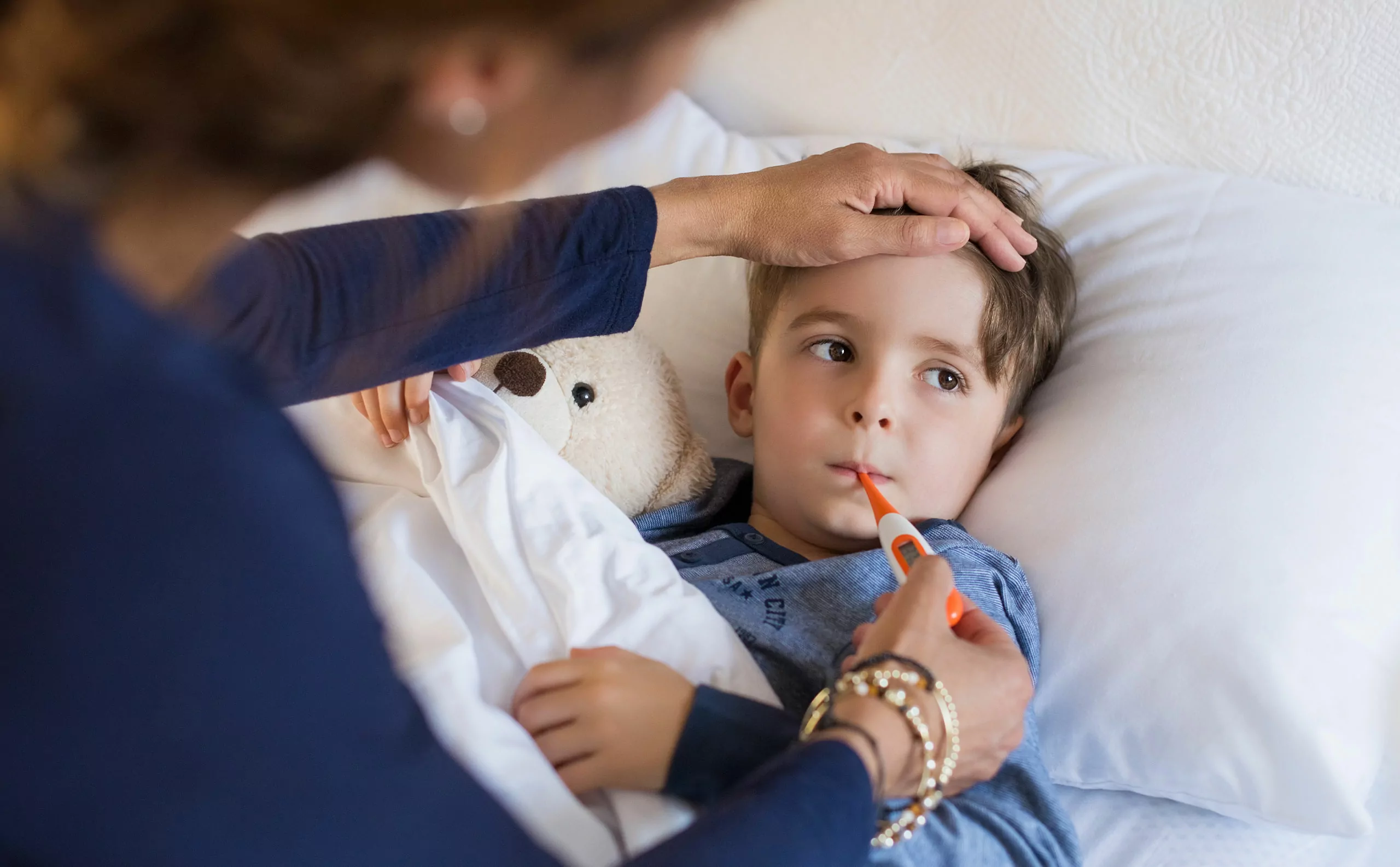When children are young—especially from birth to around five years old—their immune systems are still growing and learning how to fight off germs. As a result, it’s completely normal for young children to get sick more often than adults. In fact, most children catch between 6 to 10 colds per year. While this may seem alarming to parents, many of these illnesses are a natural part of building immunity.
In this article, we’ll break down the most common illnesses in young children, explain their causes and symptoms, and provide tips on how to manage them at home. Knowing what to expect can make it a little less stressful when your little one starts sniffling or running a fever.
1. Common Cold
The common cold is at the top of the list of childhood illnesses. It’s caused by a variety of viruses (most commonly rhinoviruses), and children can catch it easily at daycare, school, or from close contact with family members.
Symptoms:
- Runny or stuffy nose
- Coughing
- Sneezing
- Mild fever
- Sore throat
- Fatigue
How to Help:
Give your child plenty of fluids, rest, and comfort. A cool mist humidifier and saline nasal spray can also ease breathing. Avoid giving cold medicine to children under 6 unless advised by a doctor
2. Ear Infections (Otitis Media)
Ear infections are common in babies and toddlers due to the shape and size of their ear canals, which makes fluid buildup more likely after a cold.
Symptoms:
- Ear pulling or tugging
- Fussiness or crying more than usual
- Trouble sleeping
- Fever
- Fluid drainage from the ear
How to Help:
Ear infections often clear on their own, but sometimes antibiotics are needed. A warm compress and pain relievers like acetaminophen (under doctor’s guidance) can ease discomfort.
3. Hand, Foot, and Mouth Disease (HFMD)
This viral illness usually affects children under 5 and spreads quickly in childcare settings. It’s caused by viruses like Coxsackievirus.
Symptoms:
- Fever
- Painful sores inside the mouth
- Rash or blisters on hands, feet, or buttocks
- Loss of appetite
How to Help:
There’s no specific treatment, but keeping your child hydrated and comfortable is key. Avoid citrus or spicy foods that irritate mouth sores.
4. Respiratory Syncytial Virus (RSV)
RSV is a common virus that causes bronchiolitis and can sometimes lead to pneumonia in infants. It’s most serious in babies under 12 months and can require hospitalization in severe cases.
Symptoms:
- Runny nose
- Cough
- Wheezing
- Rapid or labored breathing
- Poor feeding in infants
How to Help:
Mild cases can be managed at home with fluids, rest, and cool mist humidifiers. Seek medical care if breathing becomes difficult or if your baby is under 3 months old with symptoms.
5. Gastroenteritis (Stomach Bug)
Often called the “stomach flu” (though not caused by influenza), gastroenteritis is usually viral (like norovirus or rotavirus) and leads to vomiting and diarrhea.
Symptoms:
- Nausea or vomiting
- Watery diarrhea
- Stomach cramps
- Fever
- Dehydration signs (dry lips, fewer wet diapers, no tears when crying)
How to Help:
Prevent dehydration with oral rehydration solutions (like Pedialyte). Stick to bland foods and small sips of fluids. If vomiting persists or there’s blood in the stool, consult a doctor.
6. Croup
Croup is a viral infection that causes swelling in the upper airways and is most common in children under 5. It typically occurs during the colder months.
Symptoms:
- Barking cough (like a seal)
- Hoarse voice
- Noisy breathing (stridor)
- Fever
How to Help:
Cool mist humidifiers and warm steam from a shower can help ease symptoms. If breathing becomes labored or noisy, seek emergency care.
7. Conjunctivitis (Pink Eye)
This infection affects the thin layer covering the eye and can be viral, bacterial, or allergic. It spreads easily through hand-to-eye contact or contaminated items.
Symptoms:
- Red or pink eyes
- Itchiness
- Discharge (especially with bacterial conjunctivitis)
- Crusting on eyelids
- Tearing
How to Help:
Keep eyes clean and avoid touching them. Warm compresses can help. Antibiotic drops may be prescribed for bacterial cases.
8. Flu (Influenza)
Influenza is more serious than the common cold and comes on quickly. Young children are at a higher risk for flu-related complications.
Symptoms:
- High fever
- Chills
- Body aches
- Sore throat
- Fatigue
- Cough
How to Help:
Rest and hydration are crucial. Antiviral medications may be prescribed if caught early. Annual flu shots are recommended for all children over 6 months old.
9. Strep Throat
Unlike most sore throats caused by viruses, strep throat is caused by Streptococcus bacteria and requires antibiotic treatment.
Symptoms:
- Sore throat without cough
- High fever
- Swollen lymph nodes
- Red, swollen tonsils (sometimes with white patches)
How to Help:
A doctor will confirm it with a throat swab. Antibiotics help reduce symptoms and prevent complications. Finish the full course of medication even if your child feels better.
10. Allergies and Asthma
While not infections, these chronic conditions are also common in young children and can mimic cold symptoms.
Symptoms:
- Frequent sneezing or coughing
- Wheezing or shortness of breath
- Itchy eyes
- Skin rashes or eczema
How to Help:
Identify and avoid triggers (dust, pollen, certain foods). Medications or inhalers may be prescribed. Keep regular checkups with a pediatrician or allergist.
Tips to Prevent Illness in Young Children
While you can’t completely shield kids from germs, these steps can help reduce the risk:
- Teach proper handwashing
- Keep their vaccinations up to date
- Avoid sharing cups or utensils
- Clean and disinfect toys and surfaces
- Keep sick children home from school or daycare
FAQs About Common Illnesses in Young Children
1. Is it normal for my child to get sick often?
Yes. Young children typically catch colds and other minor infections often as their immune system develops. It usually gets better as they grow older.
2. When should I take my child to the doctor?
See a doctor if your child:
- Has a high fever for more than 3 days
- Shows signs of dehydration
- Is unusually sleepy or irritable
- Has trouble breathing
- Has symptoms that don’t improve or worsen
3. Can I give my child over-the-counter cold medicine?
Most cold medicines are not safe for children under 6. Always check with your pediatrician before giving any medication to young children.
4. How can I help prevent frequent illnesses?
Promote good hygiene habits, ensure proper nutrition, keep your child active, and follow their vaccination schedule. A healthy routine helps build strong immunity.
5. Should I worry if my child gets sick after starting daycare?
No, it’s very common. Daycare environments expose children to more germs, which helps their immune systems learn. As long as symptoms are mild, it’s a normal part of development.
Final Thoughts
Watching your child get sick can be worrisome, but most common childhood illnesses are mild, short-lived, and treatable at home. Staying informed and knowing what symptoms to watch for can make a huge difference. Always trust your instincts, and don’t hesitate to reach out to your pediatrician when in doubt. Remember, every cough, sniffle, and fever is one step closer to a stronger immune system!




